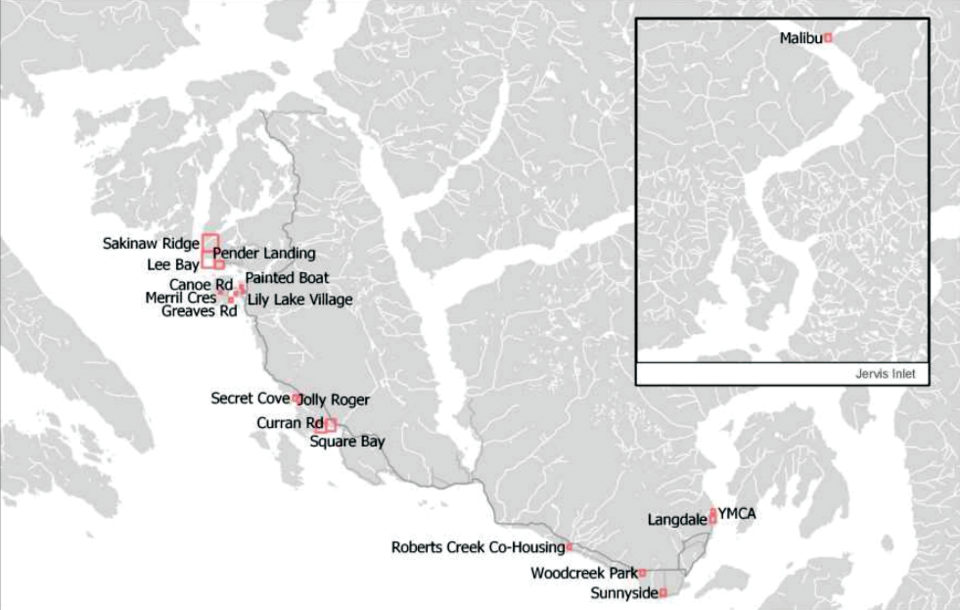A review of wastewater treatment facilities in the rural areas of the Sunshine Coast Regional District (SCRD) have uncovered several “critical issues,” including non-compliance with regulatory permits, a lack of certified staff, a lack of legally-binding agreements and in some cases the need for facility replacements, according to a staff report submitted at a Nov. 15 infrastructure committee meeting.
“There currently is insufficient funding to cover current operational requirements of the plants, nor enough operational funding to cover infrastructure planning,” the report said.
So far, 15 of the 18 facilities have been assessed and the majority of them face operational or capital needs. Those needs could lead to significant rate increases.
“Rates for some of the facilities will need to increase over 100 per cent or by several hundreds of dollars to be financially sustainable,” said the report.
All facilities, save for Pender Landing and facilities serving the YMCA Camp Elphinstone and Malibu Club, are funded through parcel taxes and user fees by properties benefitting from the service.
A total of 715 properties rely on 16 wastewater treatment facilities. The two remaining service the youth camps and costs are charged to those facility owners.
Nine of the facilities are located in Pender Harbour, four are in Halfmoon Bay, and there are two each in Elphinstone and West Howe Sound. Roberts Creek has one at the co-housing community.
The SCRD was made aware of the systemic problems after receiving a warning letter in July from a provincial regulating body for the Woodcreek wastewater treatment facility, located in Elphinstone and servicing 73 properties. The SCRD was warned for “repeatedly being in non-compliance with the water quality requirements for effluent water.”
That warning then triggered a comprehensive review of the wastewater treatment facilities managed by the SCRD, which found that “there are several other SCRD facilities that are also of concern given the effluent quality” and are at risk of getting warning letters.
Non-compliance could lead to legally binding orders, financial penalties and the suspension or cancellation of permits.
The report found that a combination of an “insufficient asset management plan” and a shortage in qualified staff “are contributing to the high amount of non-compliances with legislative requirements.”
SCRD is responsible for regular inspection and maintenance of the collection system, treatment system, and effluent disposal system of the facilities and other components specific to each facility. SCRD also oversees staffing and ensures they are qualified.
The facilities are regulated under the Environmental Management Act and six are regulated by the federal Wastewater Systems Effluent Regulations under the Fisheries Act because the effluent is discharged into the ocean.
The review also found that no access, ownership or management agreements were in place at several facilities, meaning the SCRD is legally responsible for meeting regulatory requirements without having full control over them.
Developers and community associations constructed all facilities. Once they were fully commissioned, the SCRD assumed responsibility over them, as mandated by the Local Government Act and board policy. The report also concluded that “several bylaws are outdated and the overall bylaw structure for wastewater facilities needs to be updated,” which will require public consultation.
The SCRD has been working on a comprehensive asset management plan for the facilities and working through the immediate performance issues on a case-by-case basis, but the demand on staff resources is also driving up the cost to address the problems. “This results in more overtime pay-outs and also puts strains on the existing staff and budgets. This ad-hoc process has resulted in wage and operational deficits in many of the systems over the years,” said the report.
During the meeting, Elphinstone director Donna McMahon asked staff to confirm that, “generally speaking, the fees that have been charged to the users have been covering operational costs but there hasn’t been money put aside for a capital replacement fund.”
Financial officer Tina Perreault responded, “There are varying answers for each and every one of them, so for us to provide a yes or no answer, it would be dependent on which facility you were speaking of.” As an example, she said the SCRD secured a grant to pay for the replacement of the Square Bay facility. “If you chose to pick on Secret Cove or Jolly Roger, I would have a different answer for you,” she said.
More inspections are coming and reports are expected in the first two quarters of 2019, with more details about rate increases. Consultation with affected communities will also take place. The SCRD has set the fourth quarter of 2019 as the goal for having “made significant progress on updating its binding agreement for all wastewater treatment facilities.”
The SCRD conducts its own monitoring and reports back to the Ministry of Environment and Climate Change Strategy.
“This review process has allowed us to look at it in a more comprehensive way,” said Janette Loveys, who said prior to the review, each facility had been reviewed individually. “It’s the start of an initial conversation, really,” she said.



